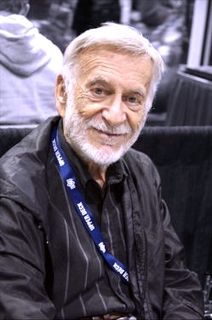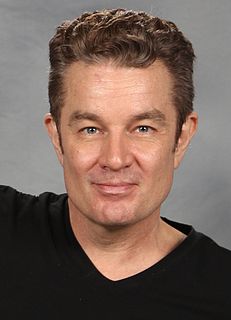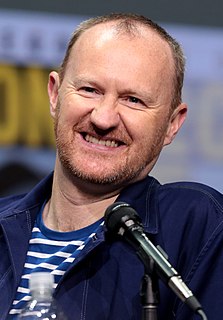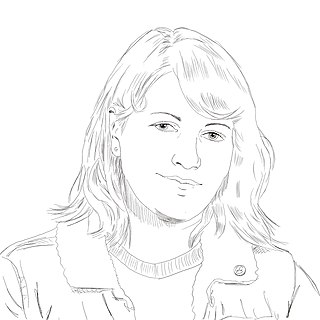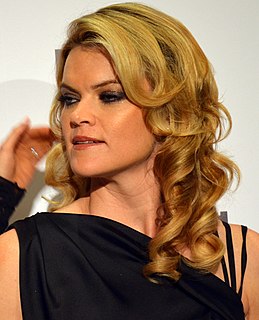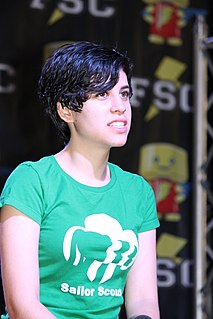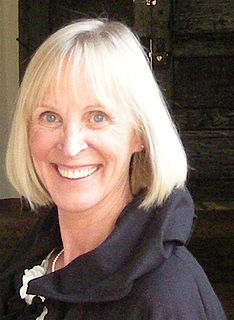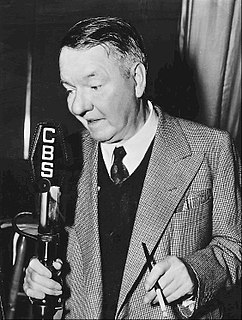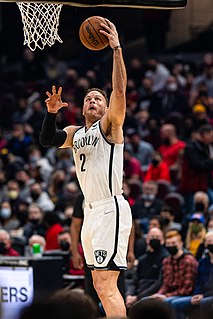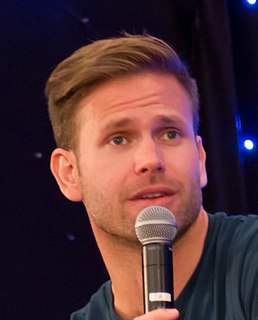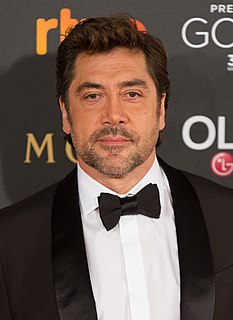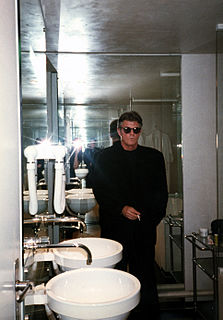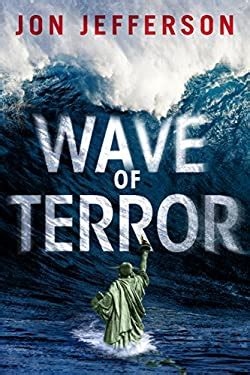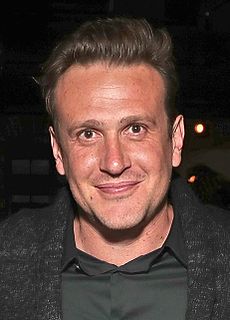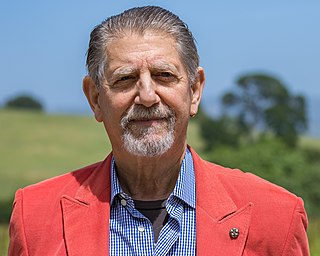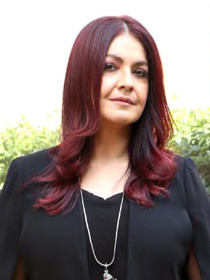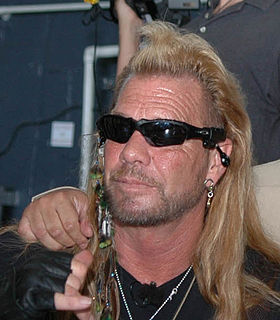Top 752 Villain Quotes & Sayings - Page 12
Explore popular Villain quotes.
Last updated on November 8, 2024.
So, I'm thinking of a name for a villain that has a sense of humor. I thought of 'The Joker' as a name, and as soon as I thought that, I associate it with the playing card, as my family had a tradition of champion playing; my brother was a contract champion bridge player. There were always cards around the house.
But if you caught my informant,' said Achilles, 'why in the world would Chamrajnagar—or Graff, if it was him—launch the shuttle anyway? Was catching me doing something naughty so important they’d risk a shuttle and it’s crew just to catch me? I find that quite… flattering. Sort of like winning the Nobel Prize for scariest villain.
People are much more complicated in real life, but my characters are as subtle and nuanced as I can make them. But if you say my characters are too black and white, you've missed the point. Villains are meant to be black-hearted in popular novels. If you say I have a grey-hearted villain, then I've failed.
How easy it is to call rogue and villain, and that wittily! But how hard to make a man appear a fool, a blockhead, or a knave, without using any of those opprobrious terms! Tosparethegrossness ofthenames, and to dothe thing yet moreseverely, isto drawa full face, and tomake the nose and cheeks stand out, and yet not to employ any depth of shadowing.
After my wife and I were married, we obtained a rescue dog from a family that didn't want her anymore. She was a beautiful Collie/Shepherd mix named 'Precious.' It then came to pass that our first marital 'debate' was whether we should change the dog's name away from the same name used by the wacky villain in 'Silence of the Lambs.'
In time truth and science and nature will adapt themselves to art. Things will happen logically, and the villain be discomfited instead of being elected to the board of directors. But in the meantime fiction must not only be divorced from fact, but must pay alimony and be awarded custody of the press despatches.
I've looked at all of Hitler's speeches thinking that there's gotta be one where he's 'I'm Hitler!', but there weren't any. His speeches were all about hope and prosperity - he ran on a platform of peace and prosperity. Hitler speeches that makes him sound like a villain are pretty hard to find, he was very detached from what he was doing, he kept himself compartmentalised from it.
[Toby Jones] is completely different. It's a completely different character. He's the darkest villain we've had. There was always something charming and engaging about Moriarty. There was something fascinating and actually amoral, rather than immoral, about Charles Augustus Magnussen. This guy is the purest evil. Sherlock [Holmes] is actually appalled by him.
Playing villains is very liberating because unlike the leading man, nothing is expected of you. Leading men have to look good, they have to behave in a certain way, they have to fulfill an audience's expectations. But as a bad guy, you have free license to take the audience by surprise. And that's what audiences want - they want unpredictability from their villains. The villain's job is to subvert it.
A lot of times I play the villain or the comic relief, and I get to kind of play the comic relief to a degree, which is fun, but I also get to say, "You are created in the image in God. You are a perfect child of God. And this part of you is the heart of who you are. You're not alone, and you're okay just the way you are."
He'd changed since the last summer. Instead of Bermuda shorts and a T-shirt, he wore a button-down shirt, khaki pants, and leather loafers. His sandy hair, which used to be so unruly, was now clipped short. He look like an evil male model, showing off what the fashionable college-age villain was wearing to Harvard this year.
This is the time for every artist in every genre to do what he or she does loudly and consistently. It doesn't matter to me what your position is. You've got to keep asserting the complexity and the originality of life, and the multiplicity of it, and the facets of it. This is about being a complex human being in the world, not about finding a villain. This is no time for anything else than the best that you've got.
People always ask me what I think, if Edward Snoden is a hero, if he's a villain. I don't really tend to moralize it so much as I feel like he's a whistleblower. He's someone who saw a wrongdoing and in order to shine a light on that wrongdoing had to bend some rules and break some laws along the way.
I got to playing villains-I don't know how. I think it's like anything else, in the movies in particular that if you establish yourself as something and you're lucky enough to keep getting hired. You know, there are guys who play the guy who gets the girl, guys who are the best friend of that guy, there's the funny guy, the villain.
There's always a villain in every book, in every movie. In every story you have the hero and what he wants, and that is the MacGuffin. The whole thing is about who's gonna get the MacGuffin. This piece that this Ace of Spades blog wrote is that's how the media covers [Barack] Obama, and I have observed this in different ways over the years.
There's a million and one things an actor can do with a villain. He can go for all kinds of quirks and tricks. The hero is much harder to define for an actor. When you play a straight role or a hero, you're kind of stuck, It's much more difficult to give a good guy interesting qualities or to make him unusual.
In order to bring a nation to support the burdens incident to maintaining great military establishments, it is necessary to create an emotional state akin to war psychology. There must be the portrayal of an external menace or of internal conditions rendered intolerable by the unjust restraints of foreign nations. This involves the development to a high degree of the nation-hero nation-villain ideology and the arousing of the population to a sense of the duty of sacrifice.
The Confessions of Catherine de Medici is a dramatic, epic novel of an all-too-human woman whose strength and passion propelled her into the center of grand events. Meticulously-researched, this engrossing novel offers a fresh portrait of a queen who has too often been portrayed as a villain. Bravo Mr. Gortner!
I can't judge the characters I play, because it's for the audience to do. What I can try to do is to understand and embody what were they going through? How did they make the decisions they made? That to me is a more interesting way to approach something, rather than saying this person is a villain and that person is this and - because it's not very interesting to play that anyway.
In other words Luke's story is historically impossible and internally inconsistent. He lied to fudge the fulfillment of Micah's prophesy and to provide a villain to play off Jesus in his fictitious drama.
Matter flows from place to place and momentarily comes together to be you. Some people find that thought disturbing. I find the reality thrilling.
I don't want to paint myself as some villain - I was never a bad guy doing horrible things, but I got too caught up in wanting a very specific thing to happen to the band. Ultimately, I had to find the ability in myself to get over that and stop being so stringent and learn to laugh a little bit more.
Acting is the great love of my life. It gives you permission to use all parts of yourself. Permission to be the hero, the love interest, the comedian, the villain. Transformation excites me. So does truth. Nothing is more thrilling, hilarious, and tragic than the truth. Those things motivated me to become an actor. Also, they always have the best food on set.
In 22 years of acting, I've only done two movies where I, personally, kill people. The Coens called me the Spanish Ballerina on (the No Country For Old Men) set, because every time I had the gun, when they called cut, I'd give it back and say, 'Take this s**t out of my hands!' There were laughing, like they couldn't believe I was supposed to be the villain.
Digital technology, you see, is not the villain here. It simply offers another dimension. I'm not sure if it's a farther remove from reality than analogue. I think if we can speak of reality, if reality and representation can be spoken of in the same sentence, if reality even exists any more, digital is simply another way of encoding that reality.
If you're going to play what-if --which, by the way, is a huge waste of time and energy, not to mention an act of supreme, center-of-the-universe narcissism-- you have to play it both ways. If you're going to imagine yourself as an accidental villain, you have to give yourself equal time as an unwitting hero. As somebody who prevented God-knows-what dire disaster simply by doing exactly the things you did.
Kids, she says. When they’re little, they believe everything you tell them about the world. As a mother, you’re the world almanac and the encyclopedia and the dictionary and the Bible, all rolled up together. But after they hit some magic age, it’s just the opposite. After that, you’re either a liar or a fool or a villain.
We spend all this energy keeping our lives normal and safe and predictable, and the result is that our approved cultural safety valve is the movies. So in films, anyway, the hero is obliged to represent the continuance of social values and institutions, and his permission to act is much more seriously limited than the villain's.
Shakespeare villains were extraordinary. Macbeth, Iago, Richard III... They're so richly layered that a British actor would find it almost impossible to create a two-dimensional villain, if he's explored in his early years or continues to explore his Shakespearean heritage. You can almost not judge them, if they're played really well.
I am not somebody who goes around saying men are superior or that male writers are superior. In fact, I really go out of my way to champion women's work that I think is not getting enough attention. None of that is ever enough. Because a villain is needed. It's like there's no way to make myself not male.
Some people who've read my story think I had a terrible childhood and that I was neglected or even abused, while others feel that my parents, while certainly flawed, also had truly wonderful qualities. And that's the way it should be, because in real life two people can look at the same president and one will see a hero and the other a villain.
Much of the attention on oceans has portrayed oceans as a villain. Warm water strengthened Hurricane Katrina that pounded Louisiana. Rising sea level will flood islands and coastal areas. Or, we're talking about new opportunities like a new shipping lane in the Arctic because of melting sea ice. These may be the obvious problems, but they're probably not the biggest ones.
So, Im thinking of a name for a villain that has a sense of humor. I thought of The Joker as a name, and as soon as I thought that, I associate it with the playing card, as my family had a tradition of champion playing; my brother was a contract champion bridge player. There were always cards around the house.
I think I'm drawn to more villain-type characters, because it's so cool to get to say all the things you want to say. In Hollywood, you get to this position where you have to bite your tongue so much. You take all your experiences of not being able to say what you really want to say, and channel that through your character.
Embracing and rejecting tradition, bound and liberated by faith, torn between obscurantism and reason, self-assured and self-critical, they were a kaleidoscope of fragments, positions held and abandoned, images formed and shattered, God-fearing Jew, God-denying Jew, passionate and indifferent, hero and villain, yea-sayer, nay-sayer.
No ideology better understands the need for enemies than neoconservatism, and when the cold war dramatically and unexpectedly ended, the way was prepared for the 'Arab threat' to emerge. 'True Lies,' the 1994 James Cameron comedy thriller starring Arnold Schwarzenegger, duly served up the Arab villain Salim Abu Aziz.
If you look at the curricula of most universities and schools in this country [USA], considering our long encounter with the Islamic world, there is very little there that you can get hold of that is really informative about Islam. If you look at the popular media, you'll see that the stereotype that begins with Rudolph Valentino in The Sheik has really remained and developed into the transnational villain of television and film and culture in general.

